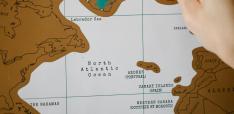Our World of Plenty is on the Brink of Unprecedented Famine. We Must Act Now

Winnie Byanyima calls for urgent action over food insecurity.
We all celebrated. Poverty in the world halved in just two decades – historic success, humankind at its best, a world altogether more free, less exposed to disease, less violent. More girls in school, too! We Africans were told that “war, famine and dictators have become rarer.”
Today that celebration stops. I often speak about how our progress for a better world is threatened by a spiraling gap between rich and poor, withering global governance, climate change and more. Now, in failing to tackle these, something profoundly catastrophic is taking hold.
The UN sounded the alarm earlier this year, joined by Oxfam and others. Our world of plenty is on the brink of unprecedented famine. Even as one famine in one country should be unacceptable – today we face the risk of four. People are dying and unless political decisions change, deaths will increase exponentially.
An urgent and bold response
Thirty million people across these four countries are severely hungry. Ten million of them face life-threatening emergency and famine conditions. That’s more people than live in London, about the same as populous Jakarta.
We expect an urgent and bold response to match - most of all by rich and powerful nations. The last famine, in 2011 in Somalia, should have been the very last: inaction there led to the deaths of nearly 260,000 people, half of them children. We can still prevent a recurrence.

I have just returned from visiting Nigeria and South Sudan where I met resilient women who told me “we want to walk freely, we want to farm, we want to feed our families.” I joined young people and entrepreneurs helping their communities survive. But even among the local people organizing themselves to share what little food and shelter and resources they have, hope is running out.
I met women newly arriving, hungry and thirsty, in the small towns of Pulka in northeast Nigeria. Their harrowing journeys lined their faces. The horrors of life under Boko Haram will not leave them. A man who’d been there for three months with his wife and children – like thousands of people – still sleeping in the open. Now the arrival of over a thousand more people this week from Cameroon is pushing services to the brink, and limited water supplies will become even more stretched. Aid agencies like ours can reach these people – we do what we can. But we need to be able to reach people in areas where the potential famine is taking hold.
In South Sudan – a country in which deadly famine was declared in February – I saw the chilling impact of a civil war. Entire communities have been driven from their homes by acts of ethnic cleansing. All I have known from war in my own country didn’t prepare me for the carcass of violence I saw. You can’t escape the stench. Malakal used to be South Sudan’s second city; today it’s more a ghost town.
The women there rationally explained to me how they choose hunger over the certainty of being raped on the journey out to collect food. The UN recently found that 70% of women in Juba, South Sudan’s capital, had been raped or abused since the war began three years prior.
Conflict and callous politics drive famine. In Somalia these conspire with drought and climate change for over three million people who urgently require support – mostly in rural areas, who are difficult to reach. The largest hunger emergency in the world is in Yemen where seventeen million do not know when they will get their next meal. Famines do not arrive like a meteor from the sky. They’re manufactured crises – the cruel consequence of government choices – and we saw them coming.
A fair share
But just as political failure led to these crises, political leadership can resolve them.
The fundamental responsibility, yes, lies with those countries and the warring parties across the contexts. They must meet their most basic obligations to protect their people, provide services and uphold the safe passage of aid.
Yet leaders of the G7 rich and powerful nations, who this week meet in Taormina, Sicily must be responsible to these people, too.
Their immediate priority must be to save these people’s lives: we are billions shy of the funding target. And money can't sit in bank accounts: it must reach those in need as quickly as possible. The UN is asking for $6.3 billion for all four countries but the world has stumped up less than a third of that. Oxfam has calculated a ‘fair share’ of funding that countries should commit to, based on their national income, and so far no G7 country has met this level, even though it is a tiny fraction of their budgets.
France, Italy, and Japan have not given their fair share for any of the four countries, whilst inhumane proposals to withdraw life-saving aid now menace lives. The Trump Administration must not hold back the US Congress’ $990 million pledge to address famine. Lives depend on it.
The most resounding plea from women I met – who have borne the brunt of the violence – was for peace. The international community must no longer be so polite. It is time to finally apply all its diplomatic pressure to push the parties towards the hard choices needed to end these conflicts. And if countries and armed groups fight – we’re realists – there are rules of war to fight by. They must too grant safe passage for civilians and access to aid agencies so we can help save lives in safety.
The G7 are not some passive observers: they’re part of an international community that must also stop fueling these conflicts. Most are selling deadly arms to the parties fighting in Yemen even as they urge a political settlement. The US last weekend announced the sale of $110 billion worth of weapons to Saudi Arabia. Precision-guided munitions that have been used to commit horrific abuses in Yemen are front and center in the sale. The UK has also sold billions of arms to Saudi Arabia, in violation of its obligations under the Arms Trade Treaty.
The G7 and G20 must also know their responsibility when, in the Horn of Africa, they see more intense natural hazards. They’re supercharged by climate change powered primarily by the emissions of rich nations. I see this as cause for more ambition in rich nations’ commitments to the Paris Agreement – not a backslide.
Each conflict is of course unique. South Sudan’s neighbors can use their strategic clout to broker peace. In particular we believe Uganda is well placed to do this. But Africa's leaders with the African Union must also act. Nigeria spells out clearest the link between economic mismanagement and conflict: this is Africa’s largest economy facing famine. Nigerians living in poverty grew to 43 million in recent years.
High corruption and the influence of big business and the wealthy elite keeps the poorest Nigerians trapped in poverty and cut-off from the benefits of economic growth and basic services. Some people - searching for the means to survive - became vulnerable to groups like Boko Haram. Nigeria’s inequality is but an extreme version of our global economic model that our powerful leaders preside over – one in which 8 men now own as much wealth as the bottom 3.6 billion people.
Let’s first avoid a catastrophic loss of life. This is happening on the G7’s watch: they must now inject the necessary cash to save lives and make a genuine push for peace. They must, too, choose to be relevant. Otherwise, we will be a long time burying the victims of further inaction.
Winnie Byanyima, Executive Director, Oxfam International. She is a leader on women’s rights, democratic governance and peace building. She served eleven years in the Ugandan Parliament, and has served at the African Union Commission and as Director of Gender and Development at the United Nations Development Program. She co-founded the 60-member Global Gender and Climate Alliance and chaired a UN task force on gender aspects of the Millennium Development Goals, and on climate change. this post first appeared on the Agenda blog.
Photo credit: infomatique via Foter.com / CC BY-SA


